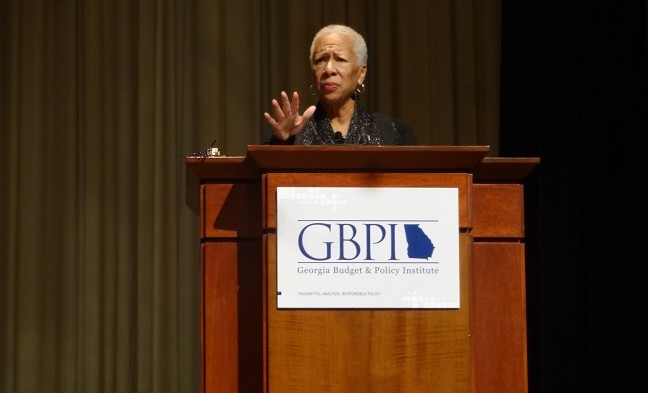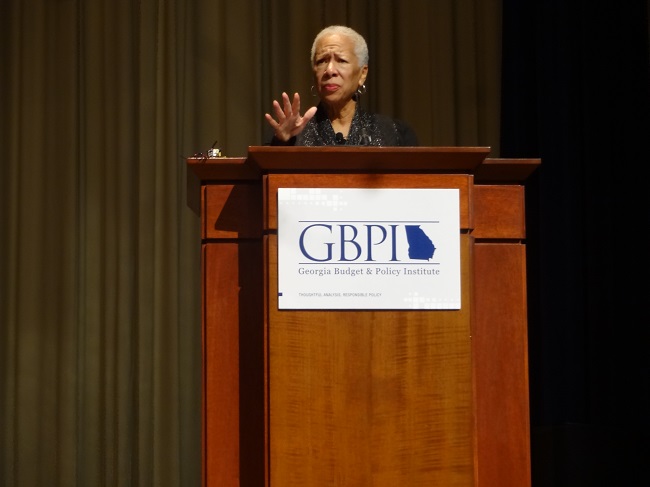

Angela Glover Blackwell is attentive the entire time at this year’s Georgia Budget & Policy Institute (GBPI) conference. As she peers through her eyeglasses, she jots down notes on a legal pad and simultaneously gives an unwavering, 180-degree stare at each speaker approaching the podium. She is intrigued by an influx of thought-provoking insights and thoughtful questions being posed but can still sense some despair and resignation coming from selected members of the audience at The Carter Center.
“All of us need to understand that we can make this country the country it needs to be,” says Blackwell, the founding president and CEO of PolicyLink, a national research and action institute committed to advancing economic and social equity. “I’m seeing that people see the problem, but I’m not feeling that people have resolved to believe that they can do something about it.”
PolicyLink was launched in 1999 as a vehicle that could potentially influence policies that affect low income families and communities of color. Issues relating to health, housing, transportation, education and employment are the organization’s primary focus areas. Blackwell, both the former senior vice president of the Rockefeller Foundation and founder of Oakland, CA’s Urban Strategies Council, shares that she created the platform to perform more tasks than simply collecting data.
Admitting to initially committing herself mentally to allotting five years for PolicyLink, the compassionate public servant and community builder synonymous with her short, salt-and-peppered-hair retreats to a small hallway bench so that she could explain in detail why she started PolicyLink. “Local communities were coming up with innovative, effective strategies to build inclusiveness,” says the St. Louis native who graduated from Howard University and earned a law degree from UC Berkeley.
“There was no policy organization that was actually being informed and accountable to that kind of work.” Born and raised by her principal father and educator mother, Blackwell witnessed her father heading their neighborhood’s fiscally integrated block association. Having that strong leadership presence is what inspired Blackwell’s life work. Her keynote address at GPBI’s conference is actually centered around how various community-oriented movements create social change.
“We needed a new kind of institution,” insists Blackwell, “one that did policy work from the wisdom, voice and experience of people who were working for change in their local communities. Inequality has become absolutely toxic. Organizing matters. Advocacy matters.”
As Blackwell takes the podium, her extremely thorough contralto oration comes with breathy emphases at the end of her rhythmic, narration-styled cadence. She speaks delicately with an array of hand mannerisms. Blackwell brings cohesion to her slightly harmonic presentation by referencing a number of research studies, personal anecdotes and detailed descriptions of two polar communities in St. Louis.
One section of PolicyLink’s website that the former partner with public interest law firm, Public Advocates, is extremely proud of is its National Equity Atlas. The e-diagram offers narrative-styled data for 150 regions for all 50 states, further providing information on how long it takes citizens to get to work via public transportation.
“We’re in a period where people are demanding for change to happen,” says the former co-chair of the Center for American Progress’ Task Force on Poverty. “When you solve problems with those who are most vulnerable, the benefits cascade out, and you solve them for everybody.”
Stressing the importance of valuing community partnerships, Blackwell makes it clear that engaging businesses and listening to young people are critical to progress. She especially applauds modern youth-driven activist efforts like #BlackLivesMatter and the reopening of Chicago’s Magnificent Mile. “The courage, idealism and anger that young people bring is something that helps create a space for change,” continues Blackwell. “We’re in partnership with them, and we need to learn from them.”
“Older people often want young people to be just like them rather than recognizing that every new generation finds its own way to express and change,” adds Blackwell. “They have found their own way to do what Dr. [Martin Luther] King was doing.” Counter to lamenting on things young people are doing, particularly on social media, Blackwell suggests communities invest more in arts and cultural programming.
“It’s so important to the full development of human beings,” says Blackwell, “yet we have so many young children of color who are just bursting with the desire to express themselves. We’re not creating the space, the resources or mentors to help them do that.”
In the years since Blackwell’s creation and execution of PolicyLink, her efforts have exceeded her expectations. She insists that the blueprint for PolicyLink was something she was trying to envision during her tenure with Rockefeller. Her discovery has taken on a life of its own, neither being heavily invested in data collection nor lobbying before legislatures.
As for Blackwell’s personal and professional development, the active member of President Obama’s Advisory Commission on Educational Excellence for African-Americans, points out how her current roles as PolicyLink’s founding president and CEO has polished her skill set. “[PolicyLink] has turned out to be the coming together of everything I’ve learned,” confirms Blackwell.
“It has allowed for the sharpening of thinking, strategy, partnerships and collaboration that seems to be endless in adapting to the opportunity of the moment.” Even with ongoing challenges and social problems affecting various communities, Blackwell remains excited about the future, coining the term “grown zone” to suggest that power, politics and policies can align to create an inclusive society despite bad things potentially hindering progress. What gives Blackwell the confidence and hope, she says, is experiencing dialogue from diverse voices.
“Everybody is at the table, and all of the cards are on the table,” proclaims Blackwell. “When you get a moment like that, change can happen.”
This post was written by Christopher A. Daniel, pop cultural critic and music editor for the Burton Wire. He is also contributing writer for Urban Lux Magazine and Blues & Soul Magazine. Follow Christopher @Journalistorian on Twitter.
Follow the Burton Wire on Twitter @TheBurtonWire or Instagram.








